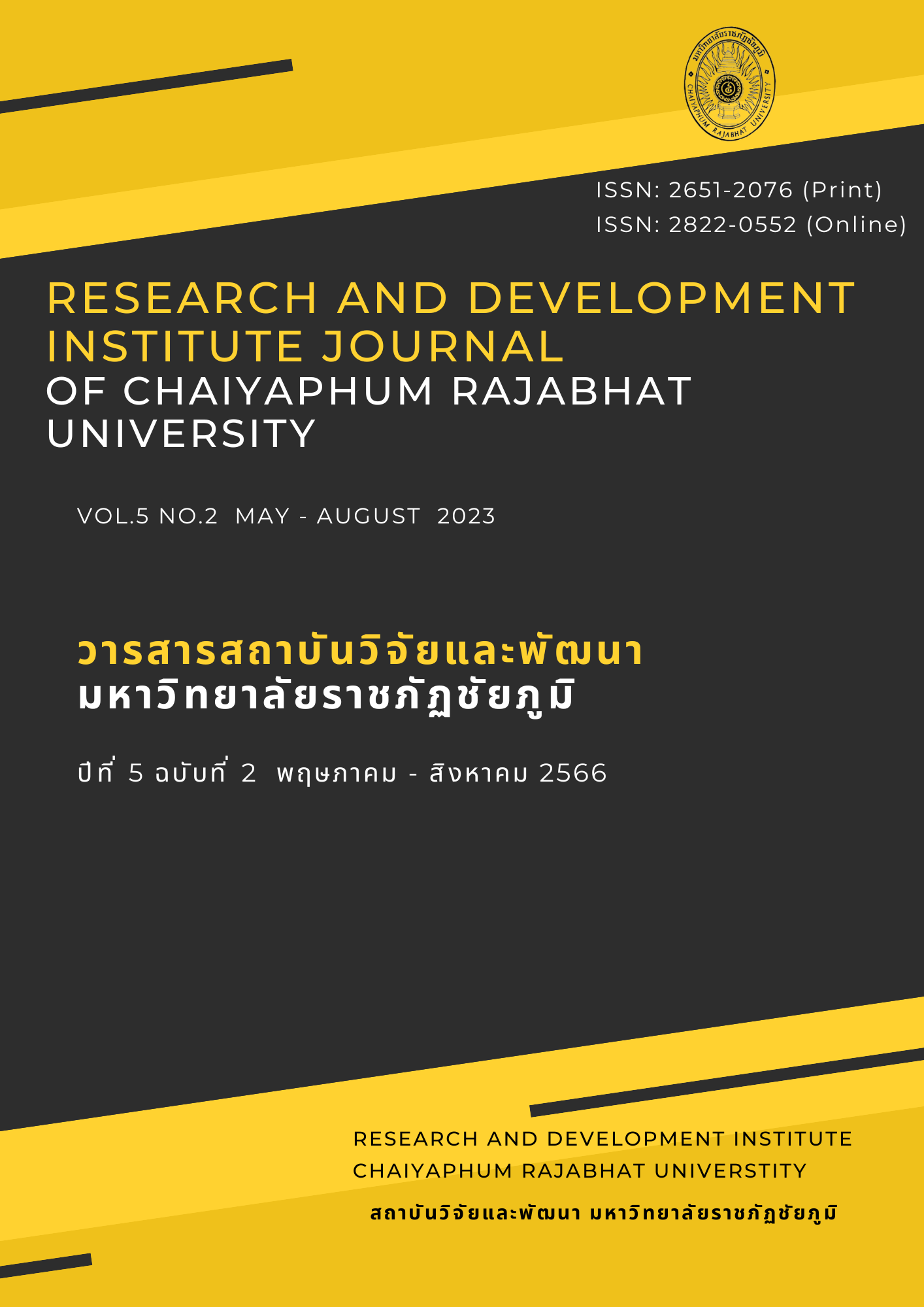ปัจจัยที่ส่งผลต่อผลสัมฤทธิ์ทางการเรียน: การวิเคราะห์อภิมาน
Main Article Content
บทคัดย่อ
การวิจัยครั้งนี้มีวัตถุประสงค์ของการวิจัยเพื่อประมาณค่าสัมประสิทธิ์สหสัมพันธ์รวมของตัวแปรที่เกี่ยวข้องกับผลสัมฤทธิ์ทางการเรียน ด้วยการวิเคราะห์อภิมาน กลุ่มตัวอย่างที่ใช้ในการวิจัยครั้งนี้ คือ งานวิจัยสหสัมพันธ์เชิงสาเหตุที่เผยแพร่ในรูปแบบรายงานการวิจัยฉบับสมบรูณ์หรือบทความวิจัยที่ศึกษาเกี่ยวกับปัจจัยที่ส่งผลต่อผลสัมฤทธิ์ทางการเรียน ที่ตีพิมพ์เผยแพร่ในช่วงปี พ.ศ. 2544 - 2564 รวมทั้งสิ้น จำนวน 25 เรื่อง และใช้วิธีการวิเคราะอภิมานค่าสัมประสิทธิ์สหสัมพันธ์รวมโดยการถ่วงน้ำหนักด้วยขนาดตัวอย่าง ด้วยโปรแกรมภาษา R Package "metaSEM"
ผลการวิจัย พบว่า
ความรู้พื้นฐานเดิม เจตคติต่อการเรียน แรงจูงใจใฝ่สัมฤทธิ์ ความตั้งใจเรียน อัตมโนทัศน์ต่อตนเอง ความสัมพันธ์ในครอบครัว การส่งเสริมจากครอบครัว คุณภาพการสอน บรรยากาศในชั้นเรียน และผลสัมฤทธิ์ทางการเรียน มีค่าสัมประสิทธิ์สหสัมพันธ์ทางบวกทุกคู่ อย่างมีนัยสำคัญทางสถิติที่ระดับ .01
Article Details

อนุญาตภายใต้เงื่อนไข Creative Commons Attribution-NonCommercial-NoDerivatives 4.0 International License.
การอนุญาตให้ใช้ข้อความ เนื้อหา รูปภาพ ฯลฯ ของสิ่งพิมพ์ ผู้ใช้รายใดก็ตามที่จะอ่าน ดาวน์โหลด คัดลอก แจกจ่าย พิมพ์ ค้นหา หรือเชื่อมโยงไปยังข้อความทั้งหมดของบทความ รวบรวมข้อมูลสำหรับการจัดทำดัชนี ส่งต่อเป็นข้อมูลไปยังซอฟต์แวร์ หรือใช้เพื่อวัตถุประสงค์ทางกฎหมายอื่นใด แต่ห้ามนำไปใช้ในเชิงพาณิชย์หรือมีเจตนาเอื้อประโยชน์ทางธุรกิจใดๆ เผยแพร่ภายใต้สัญญาอนุญาตครีเอทีฟคอมมอนส์แบบแสดงที่มา-ไม่ใช้เพื่อการค้า (Creative Commons Attribution-NonCommercial-NoDerivatives 4.0 International License)

This work is licensed under a Creative Commons Attribution-NonCommercial-NoDerivatives 4.0 International License
เอกสารอ้างอิง
กชพร ใจอดทน และอรณิชชา ทศตา (2564). ปัจจัยที่ส่งผลต่อผลสัมฤทธิ์ทางการเรียนของนักศึกษาวิทยาลัยนครราชสีมา. วารสารวิชาการสมาคมสถาบันอุดมศึกษาเอกชนแห่งประเทศไทย, 27(2), 29-41.
นงลักษณ์ วิรัชชัย และวรรณี เจตจำนงนุช. (2551). การประเมินอภิมาน และการวิเคราะห์อภิมาน รายงานผลการประเมินคุณภาพภายนอกระดับอุดมศึกษา. วารสารวิธีวิทยาการวิจัย, 21(2),126-145.
นันทพร จิตรจำลอง. (2564). ปัจจัยที่มีอิทธิพลต่อผลสัมฤทธิ์ทางการเรียนวิชาวิทยาศาสตร์ ของนักเรียนชั้นประถมศึกษาปีที่ 6 สังกัดสำนักงานเขตพื้นที่การศึกษา ประถมศึกษานครราชสีมา เขต 7. [วิทยานิพนธ์ปริญญามหาบัณฑิต]. มหาวิทยาลัยราชภัฏบุรีรัมย์.
บุญชม ศรีสะอาด. (2537). การพัฒนาการสอน. กรุงเทพฯ: สุวีริยาสาส์น.
ประยูรศรี บุตรแสนคม. (2558). การพัฒนารูปแบบการส่งเสริมทักษะการคิดขั้นสูงของนักเรียน : การประยุกต์ใช้ผลการวิเคราะห์โมเดลสมการโครงสร้างอภิมาน. [วิทยานิพนธ์ปริญญาดุษฎีบัณฑิต]. มหาวิทยาลัยมหาสารคาม.
พวงรัตน์ ทวีรัตน์. (2530). การสร้างและการพัฒนาแบบทดสอบผลสัมฤทธิ์. กรุงเทพฯ: สำนักทดสอบทางการศึกษาและจิตวิทยา มหาวิทยาลัยศรีนครินทรวิโรฒ ประสานมิตร.
Anderson, J. R. (1976). The Architecture of Cognition. Cambridge, MA: Harvard University Press.
Bandura, A., & Walters, R. H. (1977). Social learning theory (Vol. 1). Prentice Hall: Englewood Cliffs.
Cheung, M. W. L. (2015). “metaSEM: An R Package for Meta-Analysis using Structural Equation Modeling.” Frontiers in Psychology, 5(1521), 1-7.
Coleman, J. S. (1988). Social capital in the creation of human capital. American Journal of Sociology, 94, S95-S120.
Cornelius-White, J. (2007). Learner-centered teacher-student relationships are effective: A meta-analysis. Review of Educational Research, 77(1), 113-143.
Darling-Hammond, L. (2006). Constructing 21st-century teacher education. Journal of Teacher Education, 57(3), 300-314.
Darling-Hammond, L., Hyler, M. E., & Gardner, M. (2017). Effective teacher professional development. CA: Learning Policy Institute.
Dweck, C. S. (2006). Mindset: The new psychology of success. NY: Random House.
Dweck, C. S., & Leggett, E. L. (1988). A social-cognitive approach to motivation and personality. Psychological Review, 95(2), 256-273.
Eccles, J. S., Wigfield, A., & Schiefele, U. (1998). Motivation to succeed. In W. Damon & N. Eisenberg (Ed.), Handbook of child psychology: Social, emotional, and personality development (pp. 1017–1095). NJ: John Wiley & Sons, Inc.
Fan, X., & Chen, M. (2001). Parental involvement and students’ academic achievement: A meta-analysis. Educational Psychology Review, 13(1), 1-22.
Freeman, T. M., Anderman, L. H., & Jensen, J. M. (2014). Sense of belonging in college freshmen at the classroom and campus levels. The Journal of Experimental Education, 82(3), 280-297.
Hattie, J. (2009). Visible learning: A synthesis of over 800 meta-analyses relating to achievement. Oxford: Routledge.
Hidi, S., & Renninger, K. A. (2006). The four-phase model of interest development. Educational psychologist, 41(2), 111-127.
Kalyuga, S., Chandler, P., & Sweller, J. (2001). Learner experience and efficiency of instructional guidance. Educational Psychology, 21(1), 5-23.
Keith, T. Z., & Lichtman, M. (1994). The relation of family support to student achievement: Examining the effects of perceived and received support. American Educational Research Journal, 31(4), 783- 813.
Kim, Y. (2011). Family structure and children's educational achievement: A comparative study of 10 high-income countries. Demographic Research, 25, 365-406.
Marsh, H. W., & O'Mara, A. (2008). Reciprocal effects between academic self-concept, self-esteem, achievement, and attainment over seven adolescent years: Unidimensional and multidimensional perspectives of self-concept. Personality and Social Psychology Bulletin, 34(5), 542-552.
Marsh, H. W., & Yeung, A. S. (1997). Causal effects of academic self-concept on academic achievement: Structural equation models of longitudinal data. Journal of Educational Psychology, 89(1), 41-54.
Moos, R. H., & Moos, B. S. (1978). Classroom environment scale manual. CA: Consulting Psychologists Press.
Pintrich, P. R., & De Groot, E. V. (1990). Motivation and self-regulated learning components of classroom academic performance. Journal of Educational Psychology, 82(1), 33-40.
Ryan, R. M., & Deci, E. L. (2000). Self-determination theory and the facilitation of intrinsic motivation, social development, and well-being. American Psychologist, 55(1), 68-78.
Schunk, D. H., Pintrich, P. R., & Meece, J. L. (2014). Motivation in education: Theory, research, and applications (4th ed.). NJ: Pearson.
Van den Broeck, A., Vansteenkiste, M., De Witte, H., & Lens, W. (2008). Explaining the relationships between job characteristics, burnout, and engagement: The role of basic psychological need satisfaction. Work & Stress, 22(3), 277-294.
Wigfield, A., & Eccles, J. S. (2000). Expectancy-value theory of achievement motivation. Contemporary educational psychology, 25(1), 68-81.
Zimmerman, B. J., & Schunk, D. H. (2011). Handbook of Self-Regulation of Learning and Performance (1st ed.). Oxfords: Routledge.


